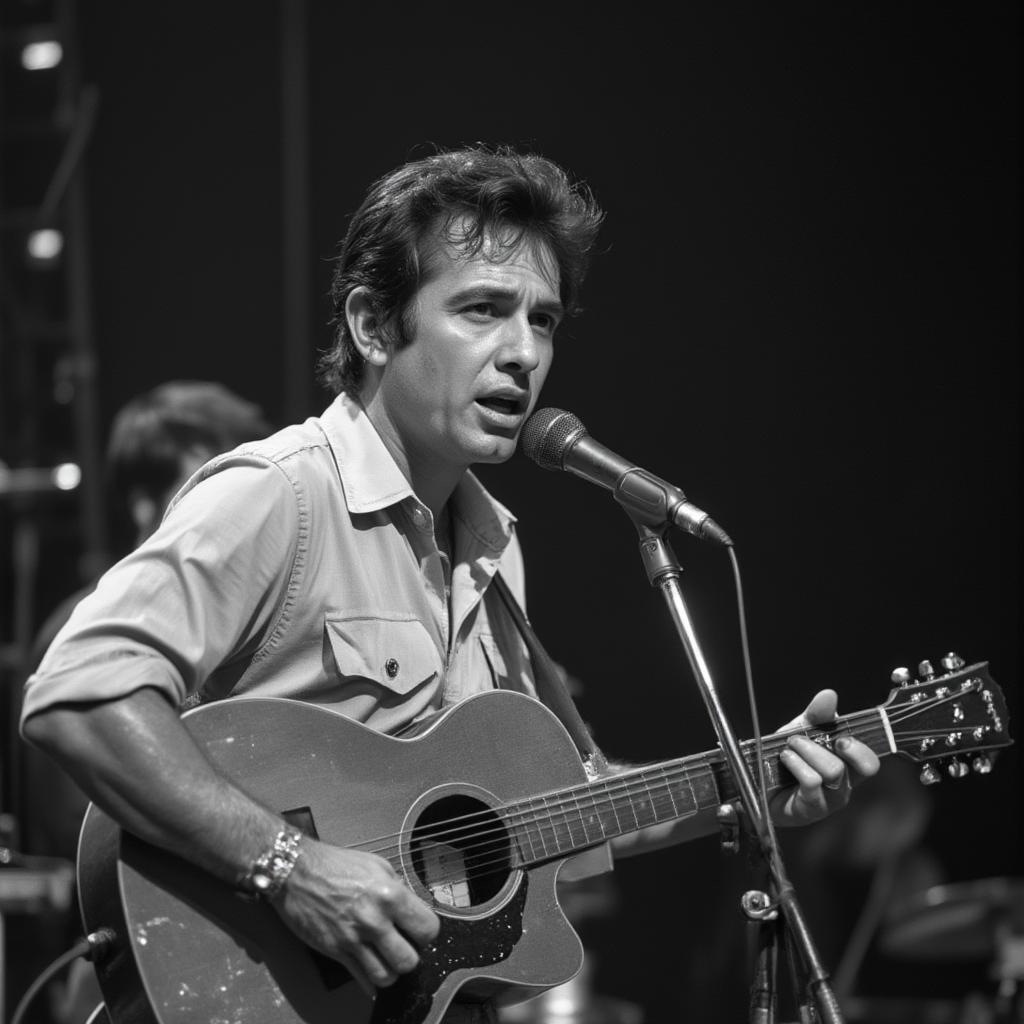This Is Johnny Cash: Unveiling the Man in Black’s Enduring Legacy

Johnny Cash. The name alone conjures images of a stoic figure in black, a voice like gravel and honey, and songs that resonate with the heart of America. But who was the man behind the legend? This Is Johnny Cash, a deep dive into the life, the music, and the enduring impact of a true icon.
The story of Johnny Cash is not a simple one. It’s a tapestry woven with threads of rural poverty, musical genius, personal struggles, and unwavering faith. He wasn’t just a singer; he was a storyteller, a champion of the underdog, and a symbol of resilience. His journey from a cotton field in Arkansas to the grand stages of the world is as compelling as any song he ever wrote. johnny cash the legend of johnny cash tells part of this story, but here, we aim to delve even deeper.
Early Life and Influences: Planting the Seeds of a Legend
Born J.R. Cash in 1932, Johnny’s upbringing in Dyess, Arkansas, was far from glamorous. The hardships of the Great Depression and the family’s struggles as sharecroppers deeply shaped his worldview. This early exposure to the realities of life – poverty, loss, and the unwavering spirit of the common folk – became a recurring theme in his music.
- The influence of gospel music within his family and community laid the foundation for his unique vocal style.
- Working in the cotton fields instilled in him a deep appreciation for hard work and a connection to the land.
- Exposure to early country music pioneers like the Carter Family and Jimmie Rodgers sparked his passion for storytelling through song.
His time in the Air Force, stationed in Germany, broadened his horizons and fueled his desire to pursue music seriously. Upon returning home, he married Vivian Liberto and began his musical journey in Memphis, a city brimming with musical energy.
The Sun Records Era: Forging the Man in Black’s Sound
Memphis in the 1950s was a melting pot of musical styles, and it was here that Johnny Cash found his voice. His raw, honest approach to country music, combined with elements of rockabilly and gospel, set him apart from his contemporaries.
- Signed to Sun Records by Sam Phillips, Cash quickly established his signature sound: a simple, rhythmic “boom-chicka-boom” accompaniment, backed by his deep baritone voice.
- Hits like “Cry! Cry! Cry!,” “Folsom Prison Blues,” and “I Walk the Line” cemented his place as a rising star in the country music scene.
- His rebellious spirit and honest lyrics resonated with a generation of young people who were searching for authenticity.
This era saw the birth of the “Man in Black” persona, a deliberate choice that distinguished him and gave voice to the marginalized. He famously said, “I wear the black for the poor and beaten down, livin’ in the hopeless hungry side of town.” This wasn’t just a fashion statement; it was a powerful message of solidarity and empathy.

Columbia Records and Beyond: A Career of Reinvention
In the late 1950s, Johnny Cash moved to Columbia Records, where he further refined his craft and broadened his musical scope. This period saw him exploring themes of love, loss, redemption, and social justice, establishing him as not just a country star but a cultural icon.
- He continued to produce hit records, like “Ring of Fire,” a song co-written with June Carter, who would later become his wife and creative partner.
- His live performances at prisons, including the legendary At Folsom Prison and At San Quentin, became iconic.
- His deep empathy for the incarcerated led to advocacy for prison reform and human rights.
“Johnny Cash wasn’t just a performer; he was an observer of life, a storyteller who could connect with anyone,” says Dr. Eleanor Vance, a musicologist specializing in American folk music. “His ability to tap into the raw emotions of the human experience is what made him so relatable and enduring.”
The Johnny Cash Show and Cultural Impact
- The Johnny Cash Show, a variety program that aired on ABC from 1969 to 1971, showcased his diverse talents and further solidified his status as a cultural touchstone.
- The show featured a wide array of guests, from country legends to rock icons, demonstrating his unique ability to bridge genres and unite diverse audiences.
- His openness to diverse styles cemented his position as an influence of music beyond the boundaries of country.
Personal Struggles and Resilience: The Human Side of the Legend
Johnny Cash’s life was not without its demons. He battled addiction for many years, struggling with prescription drugs and alcohol. His marriage to Vivian Liberto ended amidst these struggles, adding another layer of complexity to his story. Despite these hardships, he demonstrated incredible resilience and a determination to overcome his personal battles. He always spoke honestly about his battles, making it a critical part of his narrative.
- His relationship with June Carter Cash was a source of strength and inspiration.
- His faith played a crucial role in his recovery and spiritual growth.
- He transformed his struggles into profound artistic expression, as heard in songs like “Hurt.”
This openness about his personal struggles only served to make him more relatable to his audience. He wasn’t a perfect figure; he was flawed, just like everyone else. But he always strived to do better, and that honesty is what made him so beloved. the ghost of johnny cash touches upon these inner struggles, but here we delve deeper into understanding their influence.
The Later Years and Legacy: An Enduring Impact
In the later years of his life, Johnny Cash continued to create music that was both poignant and timeless. His American Recordings series, produced by Rick Rubin, introduced him to a new generation of fans and demonstrated his unwavering commitment to artistic integrity. This series also gave him a chance to explore and present a unique take on some classic American standards.
- His collaboration with younger artists revitalized his career and brought his music to a wider audience.
- His vulnerability and honesty in his later works resonated with audiences of all ages.
- He was inducted into multiple halls of fame, including the Country Music Hall of Fame, and the Rock and Roll Hall of Fame, a testament to his impact on the diverse aspects of the music industry.
“What set Johnny Cash apart was his ability to remain authentic throughout his career. He never compromised his integrity or his vision, which is what made him a true legend,” says Marcus Hayes, a long-time music journalist. “His music transcended genres because it spoke to the core of the human condition.”
His influence can still be seen and heard in the work of countless artists across various genres. He remains one of the most iconic figures in American music history. His impact on music and pop culture was a testament to his ability to appeal to all.
Why is This Johnny Cash Still Relevant Today?
The appeal of Johnny Cash transcends generations because his music tackles timeless themes that resonate with the human experience. From love and loss to redemption and resilience, his songs continue to speak to the struggles and triumphs of everyday life. His story is also one of perseverance and unwavering honesty, traits that remain universally admired. This enduring relevance is what makes him an American icon that continues to capture the hearts and minds of music lovers worldwide. His story was always authentic and genuine, and this resonates deeply even today.
The enduring themes in Johnny Cash’s Music
- Empathy and Compassion: His songs often highlighted the struggles of the marginalized and downtrodden.
- Redemption and Forgiveness: His own life story is a testament to the power of second chances.
- Honesty and Authenticity: He remained true to himself and his convictions.
Ultimately, this is Johnny Cash: not just a singer, but a poet, a rebel, a champion of the underdog, and an enduring symbol of American resilience. He was a storyteller who could connect with anyone. His music is a testament to his profound impact and the legacy he left behind. j͟o͟h͟n͟n͟y͟ ͟c͟a͟s͟h͟ provides more biographical information, but the core of his being was his music. He remains a lasting source of inspiration for artists and fans alike.
Conclusion: The Enduring Legacy of the Man in Black
Johnny Cash was more than just a musician; he was an American icon. His music told stories of hardship, redemption, and the human experience. He was a voice for the voiceless and a symbol of resilience for those facing adversity. The impact of this is Johnny Cash continues to be felt today, with his legacy shaping the landscape of country music and inspiring generations of artists. His music remains timeless, speaking to the universal truths of life, love, and loss. His honesty, his struggles, and his triumphs make him an American icon that will never be forgotten.

FAQ: Exploring Johnny Cash’s Life and Legacy
Here are some frequently asked questions about Johnny Cash, offering further insight into his life and enduring legacy.
1. Why was Johnny Cash called the “Man in Black?”
Johnny Cash adopted the “Man in Black” persona as a symbol of solidarity with the poor and marginalized, stating he wore black to represent those who have been forgotten or mistreated. He saw it as a statement of his empathy for the less fortunate.
2. What were some of Johnny Cash’s biggest hits?
Some of Johnny Cash’s biggest hits include “I Walk the Line,” “Folsom Prison Blues,” “Ring of Fire,” “A Boy Named Sue,” and “Hurt.” These songs showcased his diverse range of talent and his ability to connect with audiences on a deeply emotional level.
3. What was the significance of Johnny Cash’s prison concerts?
Johnny Cash’s prison concerts were significant because they demonstrated his empathy for the incarcerated and his commitment to social justice. The At Folsom Prison and At San Quentin albums became iconic and highlighted his unique ability to connect with people from all walks of life.
4. Who were some of Johnny Cash’s main musical influences?
Johnny Cash was influenced by early country music pioneers such as the Carter Family and Jimmie Rodgers, as well as gospel music. He also incorporated elements of rockabilly and blues into his unique sound.
5. What were the American Recordings?
The American Recordings were a series of albums produced by Rick Rubin in the later years of Johnny Cash’s life. These stripped-down, acoustic recordings revitalized his career and showcased his talent as a singer-songwriter, while also bringing him to a newer audience.
6. How did Johnny Cash meet June Carter?
Johnny Cash first met June Carter when they were both part of the Grand Ole Opry circuit. They became collaborators and close friends before eventually marrying in 1968. Their relationship was not only a personal bond but also an extremely important artistic one.
7. What is Johnny Cash’s legacy?
Johnny Cash’s legacy is one of authenticity, resilience, and social awareness. He remains a towering figure in American music, his impact felt across generations. His music continues to be celebrated for its honesty, raw emotion, and timeless themes.
8. Where can I listen to Johnny Cash’s music today?
Johnny Cash’s music is available on all major streaming platforms, as well as in physical formats like CD and vinyl. You can also find many of his performances on YouTube and other video platforms. the very best of johnny cash is a great starting point for anyone looking to explore his music.
9. What is the best way to learn more about Johnny Cash?
To learn more about Johnny Cash, exploring his discography, reading his biography, and watching documentaries about his life and career are all great options. Websites and fan forums dedicated to his work, along with the wealth of information here at Welcome Shock Naue, are also fantastic resources. We strive to be the most comprehensive resource for his legacy, providing information about all parts of his life, his work, and his continued impact on the world.




